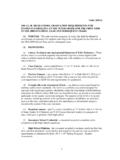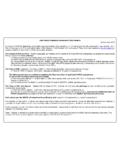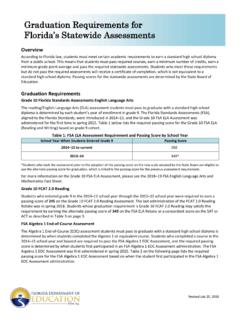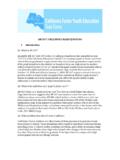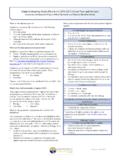Transcription of 704 KAR 3:305. Minimum requirements for high school ...
1 704 KAR 3:305. Minimum requirements for high school graduation . RELATES TO: KRS (1)(a), (c), , STATUTORY AUTHORITY: KRS , (1)(a), (c) NECESSITY, FUNCTION, AND CONFORMITY: KRS requires the Kentucky Board of Education to promulgate administrative regulations relating to the courses of study for the different grades and the Minimum requirements for high school graduation . The content standards for the courses of study are described in the program of studies, 704 KAR 3:303. This administrative regulation establishes the Minimum requirements necessary for entitlement to a high school diploma, including the requirements beginning with the graduating class of 2012. Section 1. Until the graduating class of 2012, each student in a common school shall complete an individual learning plan which incorporates emphasis on career development and shall have a total of at least twenty-two (22) credits for high school graduation .
2 Those credits shall include the following Minimum requirements : (1) Language arts: Four (4) credits (including English I, II, III, and IV; (2) Social studies: three (3) credits (to incorporate History, Economic, Government, World Geography, and World Civilization; (3) Mathematics: three (3) credits (including Algebra I, Geometry, and one (1) elective as provided in the program of studies, 704 KAR 3:303); (4) Science: three (3) credits (including life science, physical science, and earth and space science as provided in the program of studies, 704 KAR 3:303; (5) Health: one-half (1/2) credit; (6) Physical education: one-half (1/2) credit; (7) History and appreciation of visual and performing arts (or another arts course which incorporates this content): one (1) credit; and (8) Electives: seven (7) credits.)))
3 Section 2. Beginning with the graduating class of 2012, each student in a common school shall have a total of at least twenty-two (22) credits for high school graduation . Those credits shall include the content standards as provided in the program of studies, 704 KAR 3:303. Additional standards-based learning experiences shall align to the student s individual learning plan and shall consist of standards-based content. The required credits and demonstrated competencies shall include the following Minimum requirements : (1) Language arts - four (4) credits (English I, II, III, and IV) to include the content strands of reading, writing, speaking, listening, observing, inquiry, conventions, analysis, and using technology as a communication tool. Language arts shall be taken each year of high school ; (2) Social studies - three (3) credits to include the content strands of historical perspective, including History, geography, economics, government and civics, and cultures and societies; (3) Mathematics - three (3) credits to include the content strands of number property and operation, measurement, geometry, data analysis and probability, and algebraic thinking, and including the following Minimum requirements : (a) One (1) mathematics course taken each year of high school to ensure readiness for postsecondary education or the workforce based on the student's individual learning plan; (b) Required courses shall include Algebra I, Geometry, and Algebra II.
4 An integrated, applied, interdisciplinary, occupational, or technical course that prepares a student for a career path based on the student's individual learning plan may be substituted for a traditional Algebra I, Geometry, or Algebra II course on an individual student basis if the course meets the content standards in the program of studies, 704 KAR 3:303; and (c) Prealgebra shall not be counted as one (1) of the three (3) required mathematics credits for high school graduation but may be counted as an elective; (4) Science - three (3) credits that shall incorporate lab-based scientific investigation experiences and include the content strands of biological science, physical science, earth and space science, and unifying concepts; (5) Health - one-half (1/2) credit to include the content strands of individual well-being, consumer decision, personal wellness, mental wellness, and community services; (6) Physical education - one-half (1/2) credit to include the content strands of personal wellness, psychomotor, and lifetime activity; (7) History and appreciation of visual and performing arts (or another arts course which incorporates this content) - one (1) credit to include the content strands of arts, dance, music, theatre, and visual arts, or a standards-based specialized arts course based on the student s individual learning plan.
5 (8) Academic and career interest standards-based learning experiences - seven (7) credits including four (4) standards-based learning experiences in an academic or career interest based on the student s individual learning plan; and (9) Demonstrated performance-based competency in technology. Section 3. (1) A local board of education may substitute an integrated, applied, interdisciplinary, occupational, technical, or higher level course for a required course if the alternative course provides rigorous content and addresses the same applicable components of 703 KAR 4:060. (2) For students with disabilities, a local board of education may substitute a functional, integrated, applied, interdisciplinary, occupational, technical, or higher level course for a required course if the alternative course provides rigorous content and addresses the same applicable components of 703 KAR 4:060.
6 These shall be based on grade-level content standards and may be modified to allow for a narrower breadth, depth, or complexity of the general grade-level content standards. Section 4. (1) A district shall implement an advising and guidance process throughout the middle and high schools to provide support for the development and implementation of an individual learning plan for each student. The plan shall include career development and awareness and specifically address Vocational Studies Academic Expectations as established in Academic expectations, 703 KAR 4:060. (2) A district shall develop a method to evaluate the effectiveness and results of the individual learning plan process. The evaluation method shall include input from students, parents, and school staff.
7 As part of the evaluation criteria, the district shall include indicators related to the status of the student in the twelve (12) months following the date of graduation . (3) A feeder middle school and a high school shall work cooperatively to ensure that each student and parent shall receive information and advising regarding the relationship between education and career opportunities. Advising and guidance shall include information about financial planning for postsecondary education. (4) A school shall maintain each student s individual learning plan. The individual learning plan shall be readily available to the student and parent and reviewed and approved at least annually by the student, parents, and school officials. (5) Beginning with a student s eighth grade year, the individual learning plan shall set learning goals for the student based on academic and career interests and shall identify required academic courses, electives, and extracurricular opportunities aligned to the student s postsecondary goals.
8 The school shall use information from the individual learning plans about student needs for academic and elective courses to plan academic and elective offerings. (6) Beginning with the graduating class of 2013, the development of the individual learning plan for each student shall begin by the end of the sixth grade year and shall be focused on career exploration and related postsecondary education and training needs. Section 5. (1) A board of education may award credit toward high school graduation for satisfactory demonstration of learning based on content standards described in the program of studies, 704 KAR 3:303, and a rigorous performance standards policy established by the board of education. A school shall establish performance descriptors and evaluation procedures to determine if the content and performance standards have been met.
9 (2) A board of education shall award credit toward high school graduation based on: (a) A standards-based Carnegie unit credit that shall consist of at least 120 hours of instructional time in one subject; or (b) A standards-based performance-based credit, regardless of the number of instructional hours in one (1) subject. (3) A local board of education which has chosen to award standards-based performance-based credit shall award a standards-based credit earned by a student enrolled in grade 5, 6, 7 or 8 if: (a) The content of the course is the same that is established in the Program of studies, 704 KAR 3:303; and (b) The district has criteria in place to make a reasonable determination that the middle level student is capable of success in the high school course. (4) A board of education which has chosen to award standards-based performance-based credit shall establish a policy for a performance-based credit system that includes, at least: (a) The procedures for developing performance-based credit systems and for amending the system; (b) The conditions under which each high school may grant performance-based credits and the related performance descriptors and assessments; (c) Objective grading and reporting procedures; (d) Content standards as addressed in 704 KAR 3:303, Program of studies, and 703 KAR 4:060, Academic expectations; (e) The extent to which state-provided assessments will be used in the local performance-based credit system.
10 (f) The ability for students to demonstrate proficiency and earn credit for learning acquired outside of school or in prior learning; and (g) Criteria to ensure that internships, cooperative learning experiences, and other learning experiences in the school and community are: 1. Designed to further student progress towards the individual Learning plan; 2. Supervised by qualified instructors; and 3. Aligned with state and local content and performance standards. (5) A board of education may award standards-based, performance-based credit toward high school graduation for: (a) Standards-based course work that constitutes satisfactory demonstration of learning in any high school course, consistent with Section 1 or 2 of this administrative regulation; (b) Standards-based course work that constitutes satisfactory demonstration of learning in a course for which the student failed to earn credit when the course was taken previously; (c) Standards-based portfolios, senior year or capstone projects; (d) Standards-based online or other technology mediated courses; (e) Standards-based dual credit or other equivalency courses.


